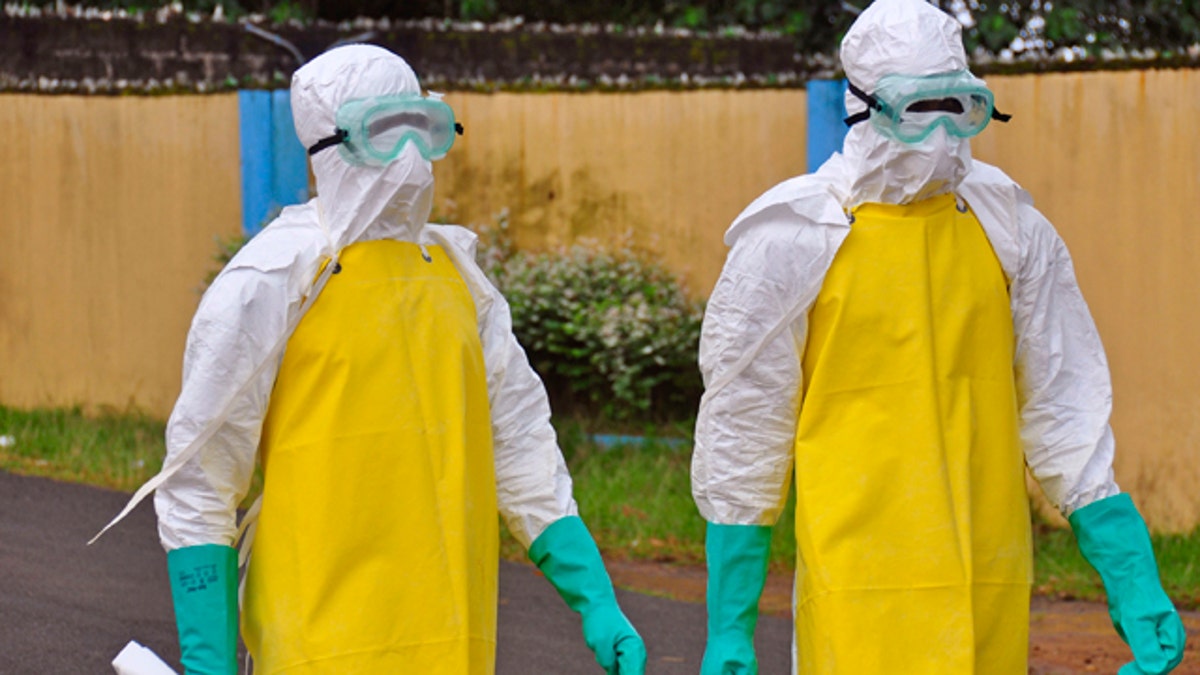
August 16, 2014: Health workers wearing protective gear go to remove the body of a person who is believed to have died after contracting the Ebola virus in the city of Monrovia, Liberia. (AP Photo/Abbas Dulleh)
MONROVIA, Liberia – Nurses on an Ebola ward in Liberia must cut up old overalls to serve as makeshift head-coverings to protect themselves from infection, despite international promises of more equipment, a health worker said Thursday.
The Ebola outbreak in West Africa has killed 1,900 people, and officials warn that time is running out to control it. Nigeria, where previously the outbreak had seemed relatively contained, is racing Thursday to track down people who may have been exposed to the disease in recent weeks.
A severe lack of protective gear for health workers, who are at high risk of infection because of their close contact with the sick, is a major obstacle to stopping the outbreak.
Health workers account for about 10 percent of the deaths so far. Much of the gear must be destroyed after use, so wards need a constant flow of equipment.
One nurse at a hospital in Monrovia, Liberia's capital, said she and her colleagues have resorted to cutting up their old uniforms and tying them on their heads. They cut holes in the fabric, so they can see, said the nurse, who spoke on condition of anonymity because she was not authorized to talk to the media.
"It is really pathetic," she said. "We are not equipped to face the situation."
With no goggles to protect them, their eyes burn from the fumes of chlorine used to disinfect the ward, the nurse said.
David and Nancy Writebol, American missionaries who worked at another hospital in Liberia, echoed those concerns, speaking to The Associated Press in North Carolina. They said doctors and nurses are overwhelmed by a surge of patients and there aren't enough hazard suits to keep them safe.
Health care workers can go through thousands of the suits a week, David Writebol said, and the suspension of flights to the region by many airlines is making it hard to get enough gear in.
Liberia has been hardest hit by the current outbreak, with the largest number of cases and deaths. Doctors Without Borders, which is running several Ebola treatment centers, said last week that its clinic in Monrovia is overrun with patients and doctors are no longer able to provide intravenous treatments.
Three American health care workers have been sickened with Ebola while working in Liberia. Nancy Writebol and Dr. Kent Brantly were flown back to the U.S. to be treated and have since recovered, while the third only recently tested positive for the disease.
The Liberian nurse, meanwhile, said that she and her colleagues live every day with the fear that they'll become infected.
"When you go through this and return home, you lie in bed asking yourself: I am still safe? Or I have contracted the disease?" she said.
International organizations have called for more equipment to be brought in, saying it's hard to persuade more health care workers to respond to the outbreak without promising them they'll be protected.
Meanwhile, health officials are monitoring more than 200 people on Thursday who may have been exposed to Ebola in southern Nigeria and are working non-stop to find more people at risk.
Authorities had been cautiously optimistic that they would be able to keep Nigeria's outbreak relatively small since the sick Liberian-American who brought the disease to Nigeria by plane was quickly isolated.
But then last month a person he had come into contact with escaped surveillance and fled to the southern oil hub of Port Harcourt. The contact infected a doctor, who, in turn, exposed dozens of people to the disease when he continued treating patients after he began having Ebola symptoms, the World Health Organization said.
Of the 200 people identified as having been exposed to the ill doctor, WHO said about 60 are considered at a high risk of getting Ebola.
Officials are also urgently tracking down more contacts and educating residents about the disease, said Dr. Sampson Parker, the health commissioner for Rivers State, where Port Harcourt is located.
Rumor, fear and confusion about Ebola, which is more typically found in Central Africa, have helped to fuel its spread. Some people hide their symptoms or avoid medical care, seeing hospitals as places where people simply go to die.
